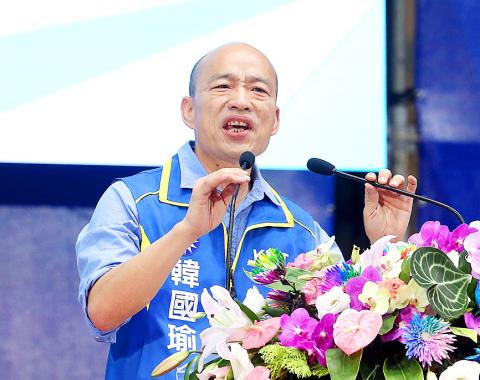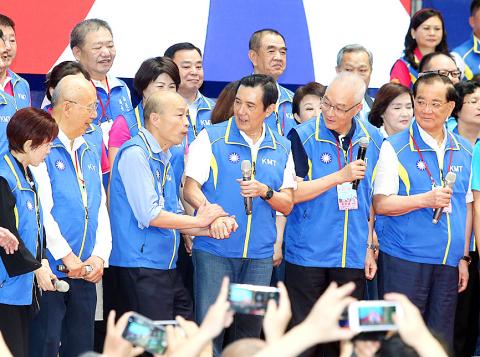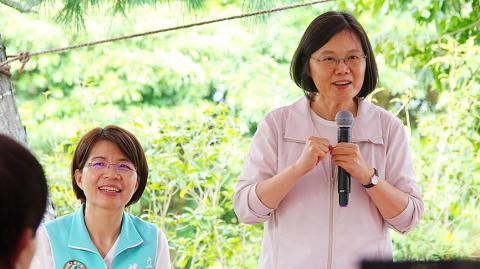The Chinese Nationalist Party (KMT) yesterday officially nominated Kaohsiung Mayor Han Kuo-yu (韓國瑜) as its candidate for next year’s presidential election.
The nomination was passed at the KMT’s National Congress at the Banciao Stadium in New Taipei City, attended by more than 1,000 delegates.
In his acceptance speech, Han expressed gratitude to the party, supporters and Kaohsiung residents, and to the other primary candidates for showing good sportsmanship.

Photo: CNA
“People assume I am filled with joy [for the nomination], but in fact the responsibility weighs heavy on my heart,” he said.
The next presidential election will not be a civilized competition, or about the KMT returning to power, but a battle that would determine the life or death of the Republic of China (ROC) and its people, he said.
For Taiwanese, the election will be a choice between “defending or destroying the ROC, obeying or breaking the Constitution” and between opening up or isolation, cross-strait peace or war, he said.

Photo: CNA
The nation’s democracy and economy have deteriorated under President Tsai Ing-wen (蔡英文), as the Democratic Progressive Party has grown increasingly corrupt, he said.
He urged Taiwanese expatriates to call and write to their local politicians and inform them of Tsai’s failings, especially those living in the US and Japan.
“Everyone is responsible for safeguarding the ROC, wherever you are,” he said.

Photo: Liu Hsiao-hsin, Taipei Times
“Taiwan needs to change” and “the Taiwanese will say no to dirty politics,” he added.
While many KMT members might not consider him an ideal candidate or a wise leader, “democracy is not about selecting one person so that he can solve everything,” he said.
Instead, it is about “electing a person who will allow members of the public to take charge” and work with them side-by-side, he said.
As someone who has experienced hardship both in his career and personal life, he truly understands the longing of the people, he said.
“We shall strive to create another Taiwan Miracle, where Taiwan is safe and the people are rich,” he said, adding that the nation would again amaze the world as it did with an economic boom three decades ago.
“The KMT cannot be weak anymore; it must get back on its feet to protect the ROC” and to lead the public to a better life, he said.
KMT Chairman Wu Den-yih (吳敦義) said the party’s goals for next year’s elections are to win the presidency and more than half of the seats in the legislature,
If it wins the presidency, it would work to improve the economy and social harmony, fight corruption and ensure cross-strait peace, he said.
The 1992 consensus is a key foundation to ensuring stable cross-strait relations, he said.
“Only by improving cross-strait relations can the nation improve its foreign relations, economy and social developments,” he said.
The so-called “1992 consensus” is a term former Mainland Affairs Council chairman Su Chi (蘇起) in 2006 admitted that he had made up in 2000 and refers to a tacit understanding between the KMT and Beijing that both sides acknowledge there is “one China,” with each side having its own interpretation of what “China” means.
The KMT delegates also passed three proposals to amend the party’s charter.
Under the changes, a KMT member elected president would no longer be required to double as party chair and the chair would be able to designate five city mayors and county commissioners to join the KMT Central Standing Committee.
Additional reporting by staff writer

ACTION PLAN: Taiwan would expand procurement from the US and encourage more companies to invest in the US to deepen bilateral cooperation, Lai said The government would not impose reciprocal tariffs in retaliation against US levies, President William Lai (賴清德) said yesterday, as he announced five strategies to address the issue, including pledging to increase Taiwanese companies’ investments in the US. Lai has in the past few days met with administrative and national security officials, as well as representatives from various industries, to explore countermeasures after US President Donald Trump on Wednesday last week announced a 32 percent duty on Taiwanese imports. In a video released yesterday evening, Lai said that Taiwan would not retaliate against the US with higher tariffs and Taiwanese companies’ commitments to

‘SPECIAL CHANNEL’: Taipei’s most important tasks are to stabilize industries affected by Trump’s trade tariffs and keep negotiations with Washington open, a source said National Security Council Secretary-General Joseph Wu (吳釗燮) arrived in the US for talks with US President Donald Trump’s administration, a source familiar with the matter said on Friday. Wu was leading a delegation for a meeting known as the “special channel,” the Financial Times reported earlier. It marked Trump’s first use of the channel since returning to the White House on Jan. 20. Citing a source familiar with the matter, the Financial Times reported that Minister of Foreign Affairs Lin Chia-lung (林佳龍) was also a part of the delegation. The visit came days after China concluded war games around Taiwan and amid Trump’s

CHIP EXCEPTION: An official said that an exception for Taiwanese semiconductors would have a limited effect, as most are packaged in third nations before being sold The Executive Yuan yesterday decried US President Donald Trump’s 32 percent tariff on Taiwanese goods announced hours earlier as “unfair,” saying it would lodge a representation with Washington. The Cabinet in a statement described the pledged US tariffs, expected to take effect on Wednesday next week, as “deeply unreasonable” and “highly regrettable.” Cabinet spokeswoman Michelle Lee (李慧芝) said that the government would “lodge a solemn representation” with the US Trade Representative and continue negotiating with Washington to “ensure the interests of our nation and industries.” Trump at a news conference in Washington on Wednesday announced a 10 percent baseline tariff on most goods

HELPING HAND: The steering committee of the National Stabilization Fund is expected to hold a meeting to discuss how and when to utilize the fund to help buffer the sell-off The TAIEX plunged 2,065.87 points, or 9.7 percent, to close at 19,232.35 yesterday, the highest single-day percentage loss on record, as investors braced for US President Donald Trump’s tariffs after an extended holiday weekend. Amid the pessimistic atmosphere, 945 listed companies led by large-cap stocks — including Taiwan Semiconductor Manufacturing Co (TSMC, 台積電), Hon Hai Precision Industry Co (鴻海精密) and Largan Precision Co (大立光) — fell by the daily maximum of 10 percent at the close, Taiwan Stock Exchange data showed. The number of listed companies ending limit-down set a new record, the exchange said. The TAIEX plunged by daily maxiumu in just